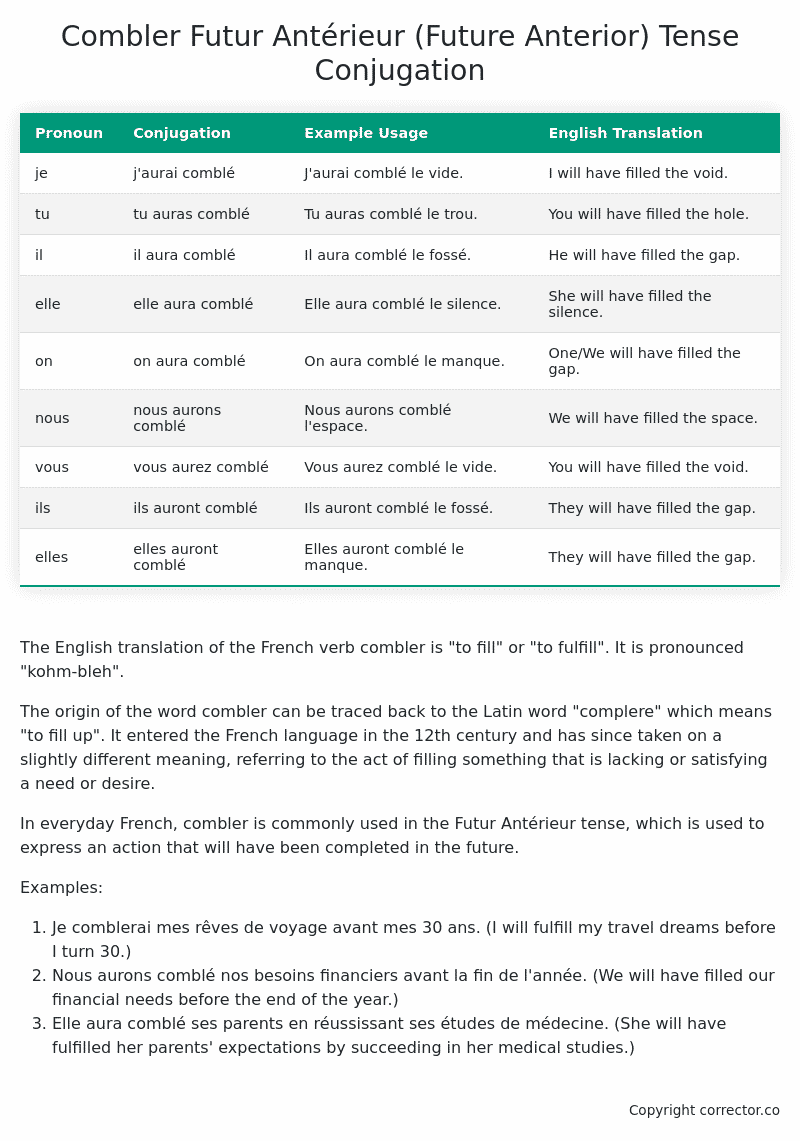Futur Antérieur (Future Anterior) Tense Conjugation of the French Verb combler
Introduction to the verb combler
The English translation of the French verb combler is “to fill” or “to fulfill”. It is pronounced “kohm-bleh”.
The origin of the word combler can be traced back to the Latin word “complere” which means “to fill up”. It entered the French language in the 12th century and has since taken on a slightly different meaning, referring to the act of filling something that is lacking or satisfying a need or desire.
In everyday French, combler is commonly used in the Futur Antérieur tense, which is used to express an action that will have been completed in the future.
Examples:
- Je comblerai mes rêves de voyage avant mes 30 ans. (I will fulfill my travel dreams before I turn 30.)
- Nous aurons comblé nos besoins financiers avant la fin de l’année. (We will have filled our financial needs before the end of the year.)
- Elle aura comblé ses parents en réussissant ses études de médecine. (She will have fulfilled her parents’ expectations by succeeding in her medical studies.)
Table of the Futur Antérieur (Future Anterior) Tense Conjugation of combler
| Pronoun | Conjugation | Example Usage | English Translation |
|---|---|---|---|
| je | j’aurai comblé | J’aurai comblé le vide. | I will have filled the void. |
| tu | tu auras comblé | Tu auras comblé le trou. | You will have filled the hole. |
| il | il aura comblé | Il aura comblé le fossé. | He will have filled the gap. |
| elle | elle aura comblé | Elle aura comblé le silence. | She will have filled the silence. |
| on | on aura comblé | On aura comblé le manque. | One/We will have filled the gap. |
| nous | nous aurons comblé | Nous aurons comblé l’espace. | We will have filled the space. |
| vous | vous aurez comblé | Vous aurez comblé le vide. | You will have filled the void. |
| ils | ils auront comblé | Ils auront comblé le fossé. | They will have filled the gap. |
| elles | elles auront comblé | Elles auront comblé le manque. | They will have filled the gap. |
Other Conjugations for Combler.
Le Present (Present Tense) Conjugation of the French Verb combler
Imparfait (Imperfect) Tense Conjugation of the French Verb combler
Passé Simple (Simple Past) Tense Conjugation of the French Verb combler
Passé Composé (Present Perfect) Tense Conjugation of the French Verb combler
Futur Simple (Simple Future) Tense Conjugation of the French Verb combler
Futur Proche (Near Future) Tense Conjugation of the French Verb combler
Plus-que-parfait (Pluperfect) Tense Conjugation of the French Verb combler
Passé Antérieur (Past Anterior) Tense Conjugation of the French Verb combler
Futur Antérieur (Future Anterior) Tense Conjugation of the French Verb combler (this article)
Subjonctif Présent (Subjunctive Present) Tense Conjugation of the French Verb combler
Subjonctif Passé (Subjunctive Past) Tense Conjugation of the French Verb combler
Subjonctif Imparfait (Subjunctive Imperfect) Tense Conjugation of the French Verb combler
Subjonctif Plus-que-parfait (Subjunctive Pluperfect) Tense Conjugation of the French Verb combler
Conditionnel Présent (Conditional Present) Tense Conjugation of the French Verb combler
Conditionnel Passé (Conditional Past) Tense Conjugation of the French Verb combler
L’impératif Présent (Imperative Present) Tense Conjugation of the French Verb combler
L’infinitif Présent (Infinitive Present) Tense Conjugation of the French Verb combler
Struggling with French verbs or the language in general? Why not use our free French Grammar Checker – no registration required!
Get a FREE Download Study Sheet of this Conjugation 🔥
Simply right click the image below, click “save image” and get your free reference for the combler Futur Antérieur tense conjugation!

Combler – About the French Futur Antérieur (Future Anterior) Tense
Construction
Common Everyday Usage Patterns
Interactions with Other Tenses
For example
Summary
I hope you enjoyed this article on the verb combler. Still in a learning mood? Check out another TOTALLY random French verb conjugation!


